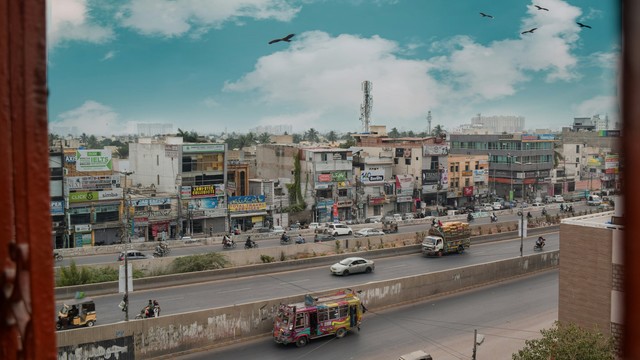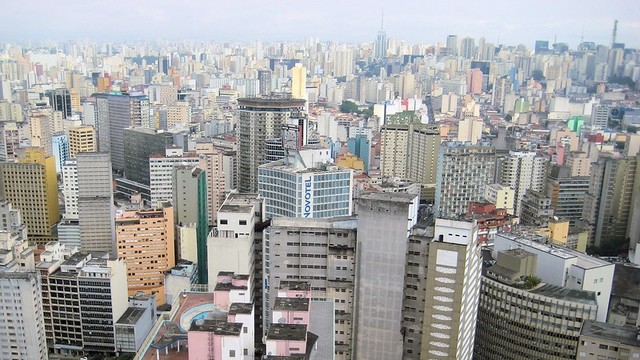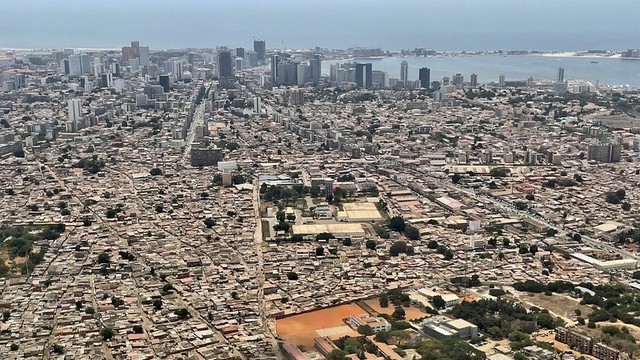Community-led waste management at scale
Guest blogger Laila Iskandar introduces us to the Zabbaleen – the unsung heroes managing Cairo’s waste – who provide an essential service achieving record recycling rates at no cost to the government.


Waste on top of buildings in Cairo (Photo: Surfingthenations via Flickr, CC BY-NC-ND 2.0)
Most city governments in the global South struggle with waste collection, which typically accounts for up to 30% of the municipal budget but often leaves large sections of the population with no service.
But over the last 70 years in Cairo, a community waste collection and management system has developed, providing what local government cannot – a regular, door-to-door, low cost, labour-intensive service with high levels of recovery/recycling that contributes to poverty alleviation through the jobs it creates.
It serves 20 million Cairenes at no cost to the government and is provided by the Zabbaleen – the city’s garbage recyclers.
The evolution of a system tailored to the city
The World Bank estimates that municipalities in developing countries spend 20-50% of their budget on solid waste collection and management. Yet 30-60% of urban solid waste is uncollected and more than half the population receives no service, so it ends up in public spaces.
What waste management exists focuses on collection, leaving very little funding for post-collection activities. In high-income nations, collection typically accounts for 10% of budget, with the remainder allocated to recycling, composting and disposal.
Several decades ago, when municipalities had not yet turned their attention to the need to formally design and implement waste management services for the residents of Cairo, farmers from the south of the country migrated to the capital and organised the daily, regular, door-to-door collection of waste from households and commercial units.
Known as the Zabbaleen, they purchased simple, low-cost equipment (first donkey carts, then trucks), used energy-saving, labour-intensive, basic technologies, and designed recovery, processing, trading and recycling systems that were specific to the nature of the material they were collecting.
They researched the markets for these materials, and took account of the habits of Cairenes, the physical layout of the city (narrow streets in low-income neighborhoods, double parking in affluent neighbourhoods, rush hour traffic and so on), the low fees residents paid, and what was needed for the Zabbaleen themselves to survive and raise families from the proceeds.
Learning from the Zabbaleen
So what can we learn from the Zabbaleen as we struggle to keep cities clean, protect waterways from plastic litter, reduce greenhouse gas emissions, relieve poverty and pay for these essential needs? Can they show us how to address all five of these interconnected challenges?
1. Keeping cities clean by managing waste better
Local governments manage solid waste using either their own workforce or by contracting out services to private operators. Financing these contracts can be problematic, as is a lack of experience in monitoring service performance.
In the global North managing the waste sector initially focused on the problems of uncontrolled dumping, moving on to environmentally-safe disposal and gradually introducing criteria to limit groundwater contamination and emissions from landfill (methane) and incinerators.
Most cities in the global South are grappling with how to provide and improve waste collection and how to manage open dumpsites. However, they are being advised to leapfrog from this unregulated state to using complex imported systems and technologies.
This can bring problems, often leading to lawsuits. High-tech, high investment technologies are designed for countries with skilled labour, technical capacity, stringent environmental regulations, strict monitoring of violations and tight compliance systems.
When cities in emerging economies adopt such systems from the global North, they are faced with multiple problems:
- Limited engineering and management know-how
- Inadequate financing for these expensive technologies
- Inappropriateness and cost of required standards
- Different waste composition with more organic content, and
- The high energy needs of modern waste-to-energy incinerators linked with unreliable collection systems that cannot guarantee the waste supply required to keep facilities operational.
2. Protecting waterways from plastic litter
The informal recyclers recover 80% of the materials they collect ensuring most plastics do not enter the city’s waterways. Over decades, the complex value chain they established adapted to changes in the physical, social and environmental fabric of the city.
As plastics, metals, glass and other materials emerged, they collected and recovered these, providing large formal recycling industries with essential feedstock.
3. Reducing greenhouse gas emissions
High levels of resource recovery/recycling reduce demand for the extraction of natural resources, the volume of waste going to garbage dumps and thus greenhouse gas emissions. In developed countries recycling is an activity of the formal sector, while in developing countries it is a resource-recovery business – not a solid waste management service.
4. Alleviating poverty
While recycling industries in the global North employ labour-saving technologies, recycling industries in the South rely on labour-intensive methods, providing livelihoods for thousands of urban poor in each city. Each tonne of collected municipal waste in Cairo generates seven direct jobs in the collection and transport sector, and a further ten jobs indirectly in the processing sector.
In Egypt, over 200 formal industrial manufacturing plants receive materials recovered from municipal waste as well as from imports. This thriving industry relies on the informal economy moving materials from collection, to sorting and recovery, to processing and transporting. It is their principal local supplier of feedstock.
But local governments still underestimate the economic role of the informal sector in the recycling value chain. They focus primarily on their role in the cleanliness of neighbourhoods through the door-to-door collection of waste – not on their role in the sorting, processing and transporting of feedstock to the formal recycling industry, their protection of the environment from leakage of plastic to waterways and/or burning in uncontrolled dumpsites.
That disconnect causes governments to choose waste management options which destroy the viability of the thousands of small and medium businesses that act as a vital conduit to the economy of formal recycling industries.
5. Who actually pays?
Informal waste collection and recycling systems rely heavily on local, small-scale, low-tech, labour-intensive methods of collection, recycling and composting. This reduces costs of the overall system closer to the ability and willingness of residents to pay for the service.
But it comes at a high human and health cost to those who operate it and their families due to insanitary conditions during the manual sorting process. And they are not paid for the actual cost of the service they provide – they are in effect subsidising municipal cleansing services.
Governments in the global South often underestimate willingness to pay, even among low-income households. A portion of the financing shortfall is corrected by informal service providers that charge residents low fees for door-to-door collection, compensating for that by recovering and recycling materials they sort.
They rely on local know-how, markets, and trading partners – offsetting their costs by efficiently and manually sorting every scrap of material they can sell.
The intrinsic value of informal operators’ contributions to the financing of waste management services and addressing these challenges in the city has never been recognised.



